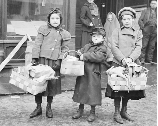 |
 |
 |
 |
 |
 |
 |
 |
 |
 |
 |
 |
 |
|
|
|
|
|
|
|
|
 |
|
|
|
|
|
|
|
|
|
|
|
|
|
|
|
|
"Masses"
Below is the poem, with analysis at the bottom.
|
|
|
|
|
|
 |
|
 |
|
|
|
|
|
|
 |
|
|
|
|
|
|
 |
|
|
|
|
|
|
 |
|
|
|
|
|
|
|
 |
|
|
|
|
|
|
|
|
|
|
|
|
|
Among the mountains I wandered and saw blue haze and
red crag and was amazed;
On the beach where the long push under the endless tide
maneuvers, I stood silent;
Under the stars on the prairie watching the Dipper slant
over the horizon's grass, I was full of thoughts.
Great men, pageants of war and labor, soldiers and work-
ers, mothers lifting their children--these all I
touched, and felt the solemn thrill of them.
And then one day I got a true look at the Poor, millions
of the Poor, patient and toiling; more patient than
crags, tides, and stars; innumerable, patient as the
darkness of night--and all broken, humble ruins of
nations.
|
|
|
|
|
|
|
|
 |
|
|
|
|
 |
|
|
|
|
|
 |
|
|
|
|
|
|
|
|
|
|
|
|
|
|
|
 |
|
|
|
|
|
|
|
|
|
Much of Sandburg's poetry is centered around the people who make up the city of Chicago and give it its own unique personality--the poor. This poem gives us one of the first true looks at the poor.
Sandburg starts the poem off by giving us a sense of the amazement he felt when he saw these beautiful products of nature. In line 9, he makes reference to the thrill he felt when seeing these. In the 10th line, there's a significant change in the mood of the poem. He shifts his focus to the poor, which doesn't give a sense of joyful amazement like the previous experiences. But Sandburg hints that the poor can possibly represent more than all of these other wonders because he gives us a sense that there's something to be seen when you look at them. He himself refers to the "true look" (line 10) he had of them. I believe it's his way of saying that we as a people never really looked at the poor.
He makes repeated references to the poor as being "patient" (lines 11-12), which creates an image in my head of people waiting for something. Perhaps waiting for things in their life to change. But he uses the word "patient" because he's not portraying them in a negative light. He also compares them to being as patient as "all broken, humble ruins of nations" (lines 13-14). Perhaps this comparison holds more weight. Maybe the poor are broken, humble ruins of this nation. They've been neglected by people. And only now has Sandburg "truly looked" at them.
|
|
|
|
|
|
 |
|
|
|
|
 |
|
|
|
|
|
 |
|
|
|
|
 |
|
|
|
|
 |
|
|
|
|
 |
|
|
|
|
 |
|
|
|
|
 |
|
|
|
|
 |
|
|
|
|
 |
|
|
|
|
 |
|
|
|
|
|
|
"More patient than crags, tides, and stars" - Lines 11-12
|
|
|
|
|
|
|
|
|
|
|
|
|
This website is a student project created for the University of Michigan's English 280 class. Created by Chris Stallman
|
|
|
|
|
 |
|
|

